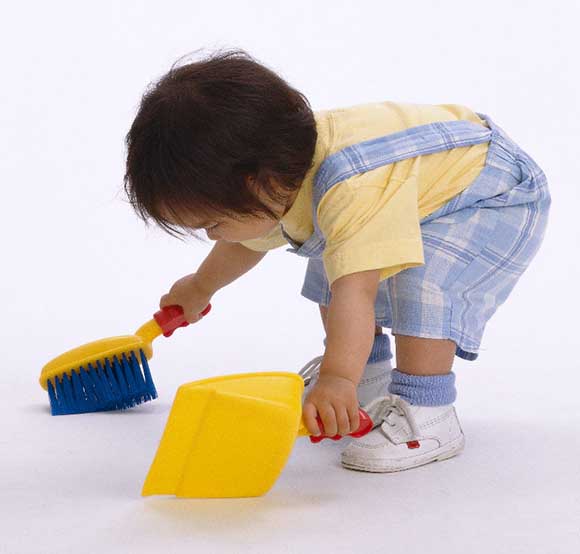Who doesn’t want to raise a well-behaved and responsible child? Well, most parents do and I suppose that includes you.
Assuming that you are part of that 99.99% of the parenting population who wants to raise good, responsible citizens … then you might like to start talking and treating your child like an adult. Sounds silly? Not really.
You see, toddlers and young children are very impressionable, meaning that they are very open and receptive to what you say and your actions, most especially when they look up to and think of you as their role model.
Sharon K. Hall, PhD, author of Raising Kids in the 21st Century says that:
When you make your expectations clear from the time your children are toddlers, they internalize those expectations and begin to expect the same thing from themselves.
According to Robert Brooks, PhD, coauthor of Raising a Self-Disciplined Child:
If you focus on the essentials starting at around age 2, your child will catch on faster, resist less, and ultimately behave better.
Start treating your child like an adult at an early age. Children as old as 18 months are already responsive to parents’ expectations. So when you treat and talk to your child like an adult, this gives your child a sense of pride and responsibility, which usually leads them to act and behave as such.
Here are the 6 clever tips for raising a responsible and well-behaved child:
6. Explain yourself. Kids ask “Why?” so much because they genuinely want to learn … When a child questions your instructions, it’s a great opportunity to teach. When you explain the reasons and context behind a rule, you’re giving the child the tools to build their own moral framework, to fill in the blanks between the rules they know and the ones they don’t. This is fundamental to learning.

As an example, if your child asks you why he cannot have a chocolate chip cookie before a meal, let him know that it will ruin his appetite and therefore won’t be able to eat his meal. Not eating a meal means that he won’t be able to grow and become a bigger boy and do things big boys do. However, if he finishes his meal, he may then have the chocolate chip cookie as a dessert. The child learns something from these types of discussions that start from a simple “why?”.
Want to have more insights into your child’s thoughts and insights?
Have a more interesting conversation with your child. It’s easy, just …
5. Ask them questions. Play this game: See how long of a conversation you can have with your child by only asking questions. At first you’ll be surprised at how much they talk. Then you’ll be surprised at how beautifully complex their minds actually are. And then you’ll be surprised at how rewarding it is to really get to know your own kid.

Besides learning more about your child, you are helping your child improve his/her communication skills. Having an ongoing conversation with your child and asking them questions also makes them feel important and shows them that you are interested in spending time with them and giving them your full attention.
Your child may be misbehaving as a result of frustration.
A child’s frustration may be a result of not having a choice when it comes to decision making.
4. Give them options. A lot of a child’s frustration stems from having no choice in anything. A lot of your frustration stems from having to make lots of tiny, trivial decisions every day that drain your mental batteries. Delegate some of those decisions to your child and you can solve both problems at once. Your child gets to feel like an important, contributing member of the family … You get to make one less decision. Win-win.

As an example, give your little girl the opportunity to decide for herself certain things which may be trivial to you but a big deal for her.
Ask, “Would you like to wear your Little Mermaid nightgown or your Super Girl pajama?” “Which fruit would you prefer to snack on, a banana or an orange?” Little decisions like these helps them think through choices and own those decisions.
Want your child to learn faster?
As long as the learning experience does not seriously hurt your child …
3. Give them space. A child has to fall a lot before they learn to walk. And they have to trip a lot before they learn to run. By giving them the space to trip and fall — to experiment and to fail — you’re helping them learn faster.

Of course, this does not mean that you abandon caution and let your child get seriously hurt to learn from his mistake. If little Johnny wants to bring his glass of water in front of the television, make sure that the glass is made of plastic and not real glass so that in case he trips and drops the glass, the only issue would be water on the floor and a bruised ego and not water and bits of glass on the floor which can potentially cut him.
If you want to prevent some potential issues and conflicts with your child from arising, then do this.
Take a proactive approach to preventing a problem situation from happening.
2. Practice defensive parenting. Remove sources of conflict before conflict arises and both parent and child will be much happier. In our case, that meant moving valuables up high, getting rid of lots of sharp stuff, and plastering the bottom 3 feet of our walls with butcher paper. Our son gets to draw on the walls without, you know, ruining our walls.

Little children are curious to learn about things. You cannot watch them all the time and tell them not to do things which can become a source of conflict. Child proofing your home is one way of doing this. You can also talk to your child and explain to them why certain things are “No No’s”. If you don’t want your child touching certain things like your cell phone or other expensive electronic gadgets, make sure to just keep them out of reach.
If you feel overwhelmed with all the things that need to be done around the house, you just have to do this.
Believe it or not, children love to help so …
1. Ask for help. Kids want to help. Ask for help washing dishes. Ask for help cracking eggs. Ask for help moving the furniture. As they get older, ask for help with things that are just at or above their developmental level. It challenges them and it gives them a powerful sense of belonging. Give them that gift as often as you can. You’ll be surprised how much they’ll want to help.

Having your child help you with a family chore helps them develop a sense of pride and accomplishment. It also helps a child learn about working together and be part of a family endeavor.
Just make sure that you are not sitting on the couch watching TV while your child does all the cleaning. Just try doing that with your spouse. I’m sure you get the point.
As you can see, these tips are more of a proactive and preventive approach to disciplining kids. The approach helps minimize incidents of misbehavior that requires punishment such as go-to-the-corner, spankings, etc.
According to Brian Davis, the author of this very helpful article from which these tips were sourced:
In the end, treating a kid like a person prevents a parent from needing “discipline” at all.
Well said Mr. Davis. We salute your parenting style and philosophy.
Did you find these tips useful?










